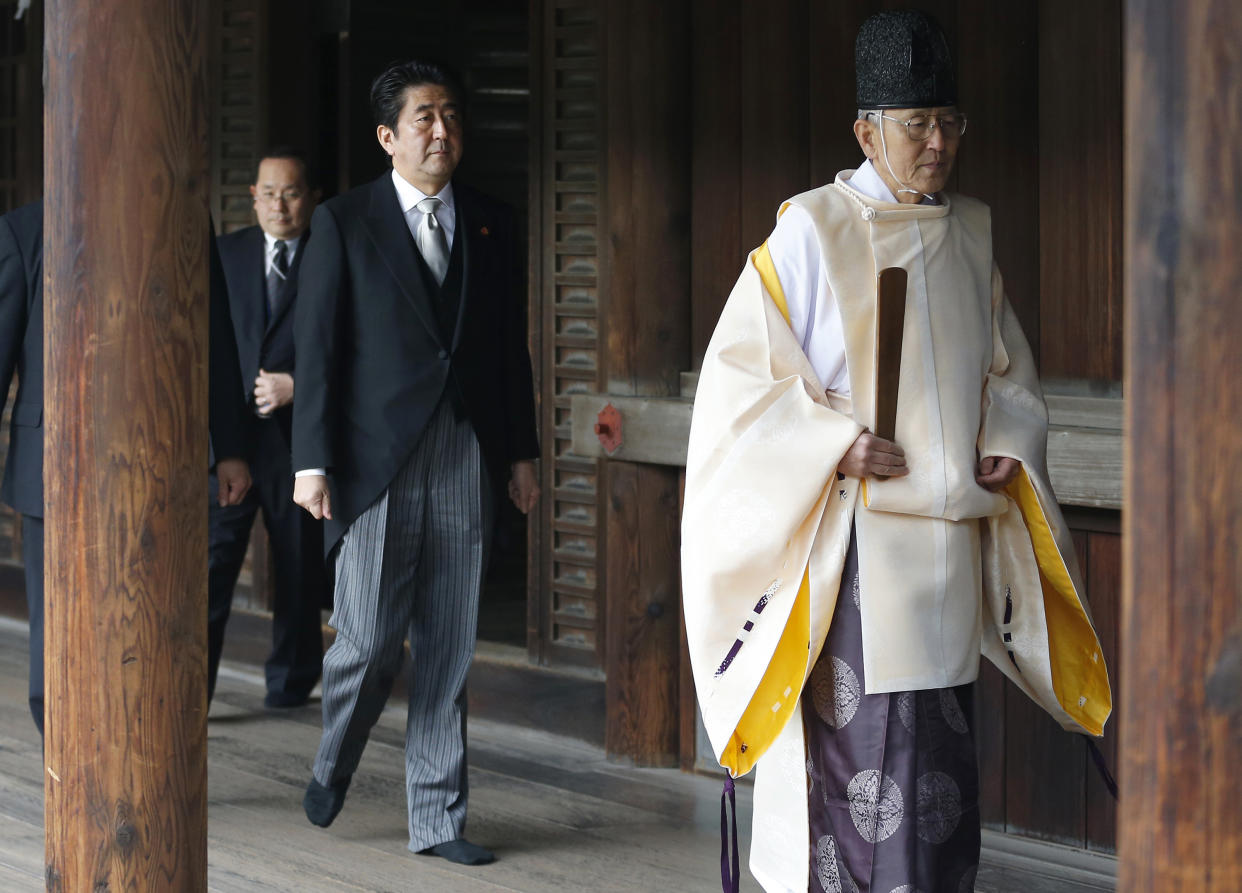China, Japan slug it out in the world's press

WASHINGTON (AP) — China and Japan are engaged in a war of words that is lighting up editorial pages around the world as Beijing takes aim at a recent visit by Japan's leader to a controversial war shrine and Tokyo answers back.
Japan's ambassador to the U.S. fired the latest salvo Friday, accusing China of a global propaganda campaign that portrays Prime Minister Shinzo Abe as glorifying Japan's militaristic past. "It is not Japan that most of Asia and the international community worry about; it is China," Ambassador Kenichiro Sasae wrote in The Washington Post.
The dueling opinion pieces, appearing in a growing number of newspapers around the world, come as both nations have been criticized for recent actions: China's declaration of an air defense zone over a disputed area of the East China Sea and the Japanese prime minister's visit to Yasukuni, where convicted World War II war criminals are among the many enshrined.
Chinese diplomats have been especially blunt. Ambassadors have accused Abe of "a gross trampling upon world peace and human conscience" on the Pacific island of Vanuatu, having "put the international community on high alert" in Australia and doing something akin to "laying a wreath at Hitler's bunker" in Madagascar.
The most headlining-grabbing exchange to date was in Britain's Daily Telegraph, where the ambassadors of China and Japan compared each other's nations, in some shape or form, to the evil Lord Voldemort of the Harry Potter books.
Beyond trying to win over world opinion, the pieces are also an attempt to placate nationalist opinion at home.
The antipathy between Japan and China is rooted in Japan's occupation of parts of China, often brutally, in the first half of the 20th century. But ties have been especially strained since Tokyo in 2012 nationalized some unoccupied islands it administers in the East China Sea that are also claimed by Beijing. That touched off nationalist sentiments in China, which viewed the step as a change in the status quo and stepped up military patrols. For its part, Japan refuses to acknowledge that's there's a territorial dispute.
The two nations' security forces have steered clear of outright confrontation around the islands, known as Senkaku by Japan and Diayou by China, so war appears a distant possibility. It would be ruinous to both their economies, which are deeply interconnected.
But the propaganda battle is a serious one.
According to Japanese officials, China has posted articles in nearly 40 countries, and Japan has so far responded in a dozen of them, with more planned.
China began the op-ed offensive days after Abe's Dec. 26 visit to the Yasukuni shrine, the first by a Japanese prime minister since 2006. The visit angered China and the two Koreas, where occupying Japanese forces committed atrocities before and during World War II. The visit also drew a rare expression of disapproval by the U.S. of its Japanese ally.
China's tough response underscored how sensitive its people are about Japan's past abuses and current Japanese attitudes. But Jim Schoff, a senior associate for the Asia program at the Carnegie Endowment for International Peace in Washington, said China was also capitalizing on an opportunity provided by Abe's visit to put Japan on the defensive.
China faced a torrent of international criticism when it declared in November an air defense identification zone over the disputed area of the East China Sea, including the islands administered by Japan. China's action deepened concern over its highhanded approach to pushing its territorial claims with its neighbors and was sharply criticized by Washington.
Last week, China's ambassador to the U.S., Cui Tiankai, took to the pages of The Washington Post to argue his case in an influential publication in a capital that has a high stake in the standoff between the Asian rivals. America's treaty alliance with Japan means it could be drawn into a conflict.
Cui accused Abe of denying wartime atrocities and linked his homage at Yasukuni to his government's efforts to loosen the constitutional constraints to reform Japan's military and project power overseas.
Sasae upped the ante Friday. He criticized "China's unparalleled military buildup," noting its growth in military spending far exceeds Japan's. He also said China's control on information and debate at home means "Chinese people cannot see the truth that people throughout the world see."
That's likely to go down badly in Beijing.
But while the prospects for improving relations in the short term appear dim, Schoff said: "Better to escalate on the pages of newspapers than in other ways."

